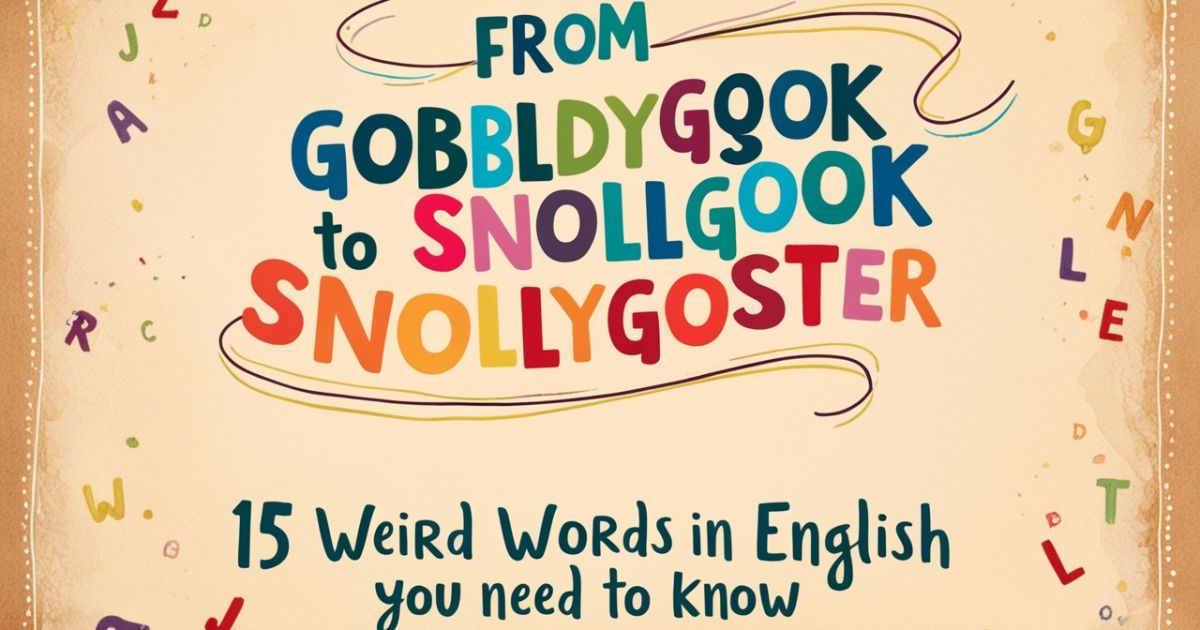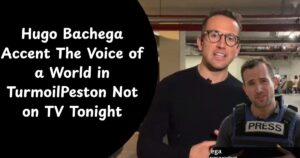English has over 170,000 words. Some are really strange. These weird words in English come from old languages, different countries, and creative people. Let’s look at 15 weird(est) words in english that sound funny and have interesting stories.
Here are 15 weird words in the English language: Petrichor, Defenestration, Sesquipedalian, Hippopotomonstrosesquippedaliophobia, Bumfuzzle, Collywobbles, Flibbertigibbet, Kerfuffle, Brouhaha, Cattywampus, Gobbledygook, Widdershins, Bumbershoot, Kakorrhaphiophobia, and Supercalifragilisticexpialidocious.
Here are the definitions and some additional details for the selected words:
- Petrichor: (n.) Earthy smell after rain.
- Defenestration: (n.) Act of throwing from window.
- Sesquipedalian: (adj.) Lover of long words.
- Hippopotomonstrosesquippedaliophobia: (n.) Fear of long words.
- Bumfuzzle: (v.) To confuse or fluster.
- Collywobbles: (n.) Nervous stomach discomfort.
- Flibbertigibbet: (n.) Silly, talkative person.
- Kerfuffle: (n.) Small fuss or commotion.
- Brouhaha: (n.) Loud uproar or overreaction.
- Cattywampus: (adj.) Crooked or misaligned position.
- Gobbledygook: (n.) Nonsense or jargon-filled language.
- Widdershins: (adv.) Counterclockwise or backward direction.
- Bumbershoot: (n.) An umbrella, old-fashioned term.
- Kakorrhaphiophobia: (n.) Fear of failing badly.
- Supercalifragilisticexpialidocious: (adj.) Fantastic, magical, extraordinary fun.
These unusual English words show how English takes words from everywhere. They are great fun words in English for people learning the language.
Why English Has Such Strange Words
English borrowed words from many languages over hundreds of years. Latin and Greek gave us long, scientific words. French came during wars. German tribes brought basic words. American settlers made up new words for things they saw.
When people moved to new places, they mixed languages together. This created quirky vocabulary that sounds strange today. Old pronunciation changed over time, making funny-sounding words that don’t match how we speak now.
15 Weirdest English Words
1. Petrichor
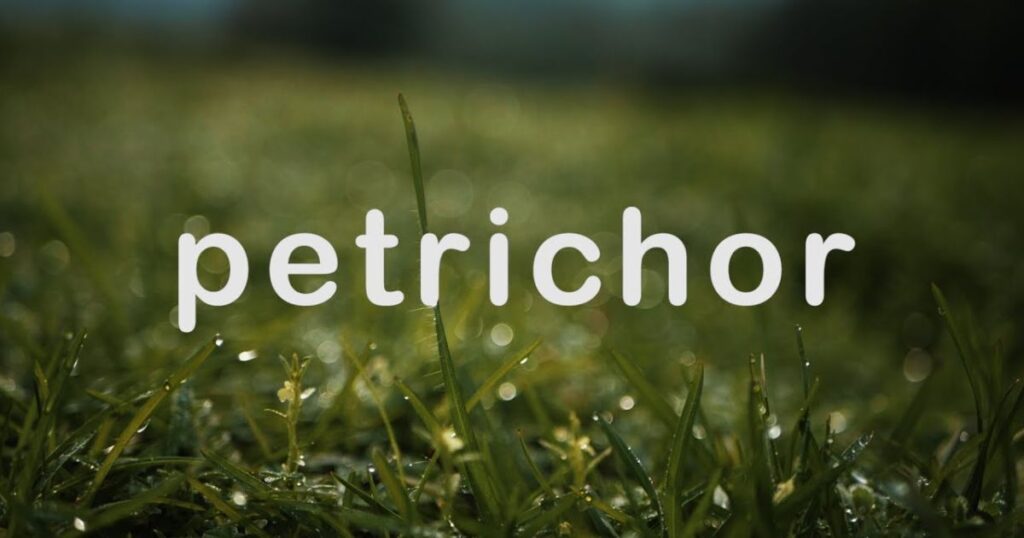
Petrichor means the smell of rain on dry ground. Two scientists made this word in 1964 using Greek words for “stone” and “god’s blood.” Everyone knows this smell, but nobody had a name for it before.
“I love the petrichor after summer storms.”
2. Defenestration
Defenestration means throwing someone out of a window. This happened in Prague twice in history when angry people threw officials out of castle windows. Now we use it when someone gets fired suddenly.
“The CEO’s defenestration shocked everyone.”
3. Sesquipedalian
Sesquipedalian describes people who use big words. The funny thing is that this word itself is really long. Romans made this word to make fun of writers who used too many big words.
“Stop being so sesquipedalian and just talk normally!”
4. Hippopotomonstrosesquippedaliophobia
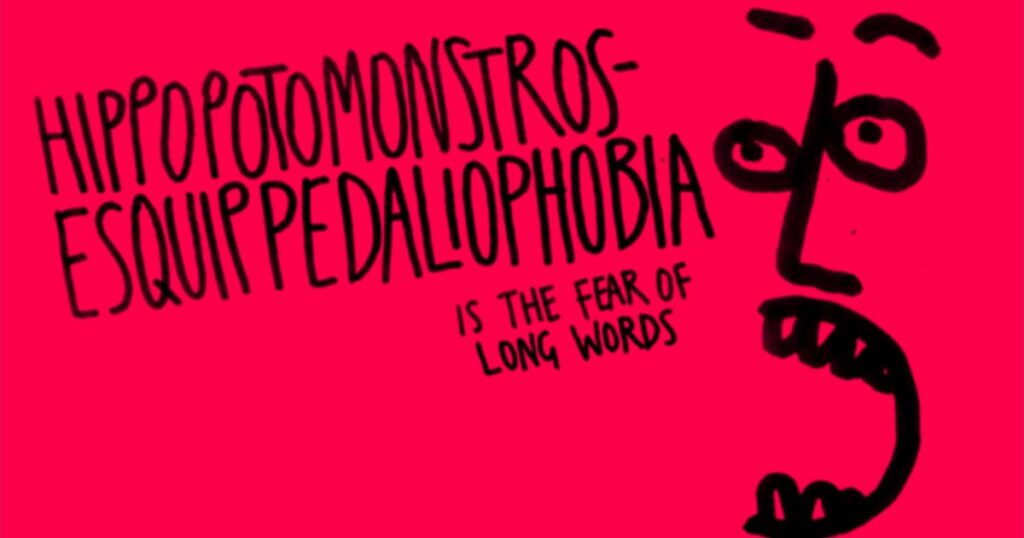
Hippopotomonstrosesquippedaliophobia is the fear of long words. This is mean because people who have this fear can’t even say the name of their problem. It’s made from Greek words meaning “hippo,” “monster,” and “long words.”
Most doctors don’t use this word because it’s too hard to say.
5. Bumfuzzle
Bumfuzzle means to confuse someone completely. American farmers started using this word in the 1800s. It comes from mixing “bamboozle” with other confusing words.
“The math problem bumfuzzled all the students.”
6. Collywobbles
Collywobbles means stomach problems or feeling nervous. British people started saying this in the 1820s. It’s a fun way to talk about butterflies in your stomach.
“Speaking in public gives me the collywobbles.”
7. Flibbertigibbet
Define flibbertigibbet: someone who talks too much about silly things. Shakespeare used this word in his plays. It started as a demon’s name but became a way to describe chatty people.
“Don’t be such a flibbertigibbet during the meeting.”
8. Kerfuffle
Kerfuffle meaning: a small fight or argument. This word comes from Scotland. It started as a way to describe dogs fighting, but now we use it for any kind of fuss or trouble.
“The new rules caused quite a kerfuffle at school.”
9. Brouhaha

Brouhaha means a noisy argument. This word comes from French theater, where it was the sound of crowds. Newspapers love using this word for big scandals.
“The mayor’s mistake caused a huge brouhaha.”
10. Cattywampus
Cattywampus example: something that’s crooked or not straight. American country people made this word up. It might come from “catty-corner” mixed with other words meaning “messy.”
“The tornado left everything cattywampus.”
11. Gobbledygook
Gobbledygook definition: language that doesn’t make sense. A Texas politician made this word in 1944 because he was tired of government papers that nobody could understand. He said they sounded like turkeys.
“This contract is full of gobbledygook.”
12. Widdershins
Widdershins means going counter-clockwise or backwards. Old Celtic and German people thought this was bad luck. Widdershins superstitions said witches moved this way.
“She walked widdershins around the old tree.”
13. Bumbershoot
Bumbershoot is a funny word for umbrella. Americans made this up in the 1890s by mixing “umbrella” and “parachute.” People in rainy places like Seattle still use it.
“Don’t forget your bumbershoot – it’s going to rain!”
14. Kakorrhaphiophobia
Kakorrhaphiophobia is the fear of failing. Doctors made this word from Greek parts meaning “bad” and “fear of failure.” Most doctors use simpler words when talking to patients.
“His kakorrhaphiophobia stopped him from trying new things.”
15. Supercalifragilisticexpialidocious
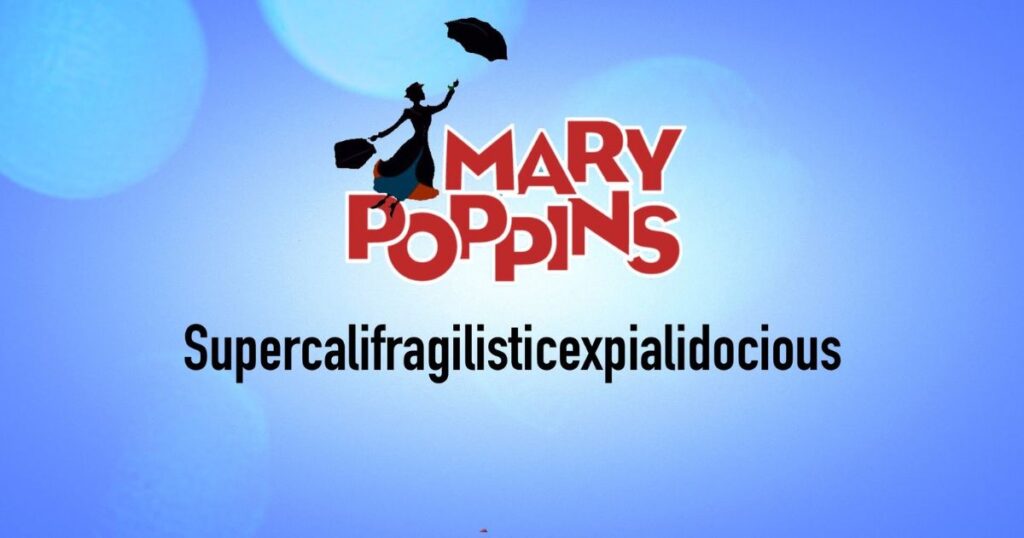
Supercalifragilisticexpialidocious means something really wonderful. The movie “Mary Poppins” made this word famous, but similar words existed before. It’s made from Latin and Greek parts.
“The circus was supercalifragilisticexpialidocious!”
Why These Words Are Important
These strange words in English language help us understand history and culture. They show how people solved problems by creating new words. For English words for ESL learners, these examples prove that English is creative and fun.
Teachers can use these weird English words for foreigners to make lessons more interesting. Students remember odd words list better than boring vocabulary because they’re unusual.
How to Use Strange Words
Creative language tips: Don’t use too many weird words at once. They work best in stories or when you want to sound interesting. Learn English vocabulary by studying where words come from and why people made them.
English learning tips: Learn one strange word each week. Practice using it in sentences. Tell friends about weird funny words you discover. This makes study English online more fun.
Conclusion
The weirdest words in English show how creative people can be with language. These uncommon English words explained prove that English grows and changes all the time.
Whether you’re learning English for beginners and advanced learners or just curious about weird words with meaning, these examples show that language is alive and full of surprises.
Build vocabulary fast by exploring these unusual terms. Share your favorite weird but real English words with friends. Language learning becomes more enjoyable when you discover these hidden treasures.
FAQ’s
Why does English have so many weird words?
English borrowed from many languages over hundreds of years. Different cultures mixed their words together, creating strange combinations.
What’s the longest English word?
Hippopotomonstrosesquippedaliophobia and floccinaucinihilipilification are among the longest regular words, but science has even longer ones.
How do new words get added to English?
New words come from technology, other languages, combining old words, or creative invention by speakers.
Can I use these words in school writing?
Most weird English words to pronounce work better in creative writing or casual conversation than in formal school papers.

Faraz Babar is a skilled wordsmith with a keen interest in the rich world of synonyms and language nuances. With a flair for simplifying complex vocabulary, he crafts content that’s both enlightening and enjoyable to read.
